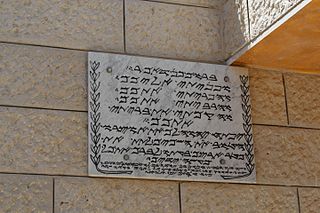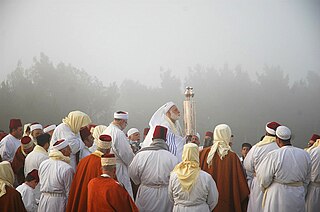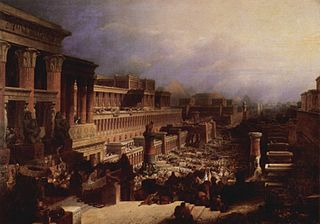
Jewish holidays, also known as Jewish festivals or Yamim Tovim, are holidays observed in Judaism and by Jews throughout the Hebrew calendar. They include religious, cultural and national elements, derived from three sources: biblical mitzvot ("commandments"), rabbinic mandates, and the history of Judaism and the State of Israel.

Matzah, or matza is an unleavened flatbread that is part of Jewish cuisine and forms an integral element of the Passover festival, during which chametz is forbidden.

Passover, also called Pesach, is a major Jewish holiday that celebrates the exodus of the Israelites from slavery in Egypt, which occurs on the 15th day of the Hebrew month of Nisan, the first month of Aviv, or spring. The word Pesach or Passover can also refer to the Korban Pesach, the paschal lamb that was offered when the Temple in Jerusalem stood; to the Passover Seder, the ritual meal on Passover night; or to the Feast of Unleavened Bread. One of the biblically ordained Three Pilgrimage Festivals, Passover is traditionally celebrated in the Land of Israel for seven days and for eight days among many Jews in the Diaspora, based on the concept of yom tov sheni shel galuyot. In the bible the seven-day holiday is known as Chag HaMatzot, the feast of unleavened bread (matzoh).

Samaritanism is the Abrahamic, monotheistic, ethnic religion of the Samaritan people, an ethnoreligious group who, alongside Jews, originate from the ancient Israelites. Its central holy text is the Samaritan Pentateuch, which Samaritans believe is the original, unchanged version of the Torah that is used by Jews. In addition to the Samaritan Pentateuch, Samaritans also revere their version of the Book of Joshua and recognize some later Biblical figures such as Eli.

Samaritans are an ethnoreligious group who originate from the ancient Israelites. They are native to the Levant and adhere to Samaritanism, an Abrahamic and ethnic religion.

The Passover Seder is a ritual feast that marks the beginning of the Jewish holiday of Passover. It is conducted throughout the world on the eve of the 15th day of Nisan in the Hebrew calendar. The day falls in late March or in April of the Gregorian calendar and the Passover lasts for seven days in Israel and eight days outside Israel. Jews generally observe one or two seders: in Israel, one seder is observed on the first night of Passover; many Jewish diaspora communities hold a seder also on the second night. The Seder is a ritual performed by a community or by multiple generations of a family, involving a retelling of the story of the liberation of the Israelites from slavery in ancient Egypt. This story is in the Book of Exodus (Shemot) in the Jewish Torah. The Seder itself is based on the Biblical verse commanding Jews to retell the story of the Exodus from Egypt: "You shall tell your child on that day, saying, 'It is because of what the LORD did for me when I came out of Egypt.'" Traditionally, families and friends gather in the evening to read the text of the Haggadah, an ancient work derived from the Mishnah. The Haggadah contains the narrative of the Israelite exodus from Egypt, special blessings and rituals, commentaries from the Talmud, and special Passover songs.

Shavuot, or Shavuos in some Ashkenazi usage, commonly known in English as the Feast of Weeks, is a Jewish holiday that occurs on the sixth day of the Hebrew month of Sivan. In the Bible, Shavuot marked the wheat harvest in the Land of Israel. In addition, Orthodox rabbinic traditions teach that the date also marks the revelation of the Torah to Moses and the Israelites at Mount Sinai, which, according to the tradition of Orthodox Judaism, occurred at this date in 1314 BCE.

Counting of the Omer is an important verbal counting of each of the forty-nine days starting with the Wave Offering of a sheaf of ripe grain with a sacrifice immediately following the commencement of the grain harvest, and the First Fruits festival celebrating the end of the grain harvest, known as Feast of Weeks/Shavuot/Pentecost in Mosaic Law ; or in the varying current Jewish holidays traditions, the period between the Passover or Feast of Unleavened Bread, and Shavuot. This is the second of the three annual Mosaic Law feast periods.
Exodus or the Exodus may refer to:

The Plagues of Egypt, in the story of the book of Exodus, are ten disasters inflicted on Biblical Egypt by the God of Israel in order to convince the Pharaoh to allow the Israelites to depart from slavery, each of them confronting Pharaoh and one of his Egyptian gods; they serve as "signs and marvels" given by God to answer Pharaoh's taunt that he does not know Yahweh: "The Egyptians shall know that I am the LORD".
The Three Pilgrimage Festivals, in Hebrew Shalosh Regalim, are three major festivals in Judaism—Pesach (Passover), Shavuot, and Sukkot —when all ancient Israelites who were able would make a pilgrimage to the Temple in Jerusalem, as commanded by the Torah. In Jerusalem, they would participate in festivities and ritual worship in conjunction with the services of the kohanim ("priests") at the Temple.

The Exodus is the founding myth of the Israelites, recounted in the Book of Shemot. It tells a story of Israelite enslavement and departure from Egypt, revelations at biblical Mount Sinai, and wanderings in the wilderness up to the borders of Canaan. Its message is that the Israelites were delivered from slavery by Yahweh their god, and therefore belong to him by covenant.

Dayenu is a song that is part of the Jewish holiday of Passover. The word "dayenu" means approximately "it would have been enough", "it would have been sufficient", or "it would have sufficed". This traditional up-beat Passover song is over one thousand years old. The earliest full text of the song occurs in the first medieval haggadah, which is part of the ninth-century Seder Rav Amram. The song is about being grateful to God for all of the gifts he gave the Jewish people, such as taking them out of slavery, giving them the Torah and Shabbat, and had God only given one of the gifts, it would have still been enough. This is to show much greater appreciation for all of them as a whole. The song appears in the haggadah after the telling of the story of the exodus and just before the explanation of Passover, matzah, and the maror.

The Song of the Sea is a poem that appears in the Book of Exodus of the Hebrew Bible, at Exodus 15:1–18. It is followed in verses 20 and 21 by a much shorter song sung by Miriam and the other women. The Song of the Sea was reputedly sung by the Israelites after their crossing the Red Sea in safety, and celebrates the destruction of the Egyptian army during the crossing, and looks forward to the future conquest of Canaan.

Bo is the fifteenth weekly Torah portion in the annual Jewish cycle of Torah reading and the third in the Book of Exodus. The parashah constitutes Exodus 10:1–13:16. The parashah tells of the last three plagues on Egypt and the first Passover.

The Passover sacrifice, also known as the Paschal lamb or the Passover lamb, is the sacrifice that the Torah mandates the Israelites to ritually slaughter on the evening of Passover, and eat on the first night of the holiday with bitter herbs and matzo. According to the Torah, it was first offered on the night of the Exodus from Egypt. Although practiced by Jews in ancient times, the sacrifice is today only part of Beta Israel, Karaite and Samaritan observance.
Special Shabbatot are Jewish Shabbat days on which special events are commemorated. Variations in the liturgy and special customs differentiate them from the regular Sabbaths and each one is referred to by a special name. Two such Sabbaths, Shabbat Mevarchim, which immediately precedes a new month, and Shabbat Rosh Chodesh, which coincides with the new month, can occur on several occasions throughout the year. The other special Sabbaths occur on specific sabbaths before or coinciding with certain Jewish holidays during the year, according to a fixed pattern.

Rosh HaShanah, is the Jewish New Year. The biblical name for this holiday is Yom Teruah, literally "day of shouting or blasting." It is the first of the Jewish High Holy Days, as specified by Leviticus 23:23–25, that occur in the late summer/early autumn of the Northern Hemisphere. The High Holy Days comprises both Rosh HaShanah and Yom Kippur.

"A Rugrats Passover" is the 26th and final episode of the third season of the American animated television series Rugrats. It first aired on Nickelodeon in the United States on April 13, 1995. The episode follows series regulars Grandpa Boris and the babies as they become trapped in the attic on Passover; to pass the time, Boris tells the Jewish story of the Exodus. During the episode, the babies themselves reenact the story, with Tommy portraying Moses, while his cousin Angelica represents the Pharaoh of Egypt.
The animated television series Rugrats has been noted for its portrayal of Judaism, a dynamic rarely represented in American animated programming during the series' broadcast run (1991–2004). Six episodes of the series are devoted to Jewish holidays and to explaining their history, and the Pickles family is shown to be part-Jewish.















